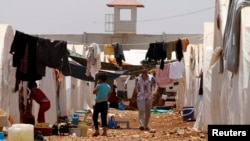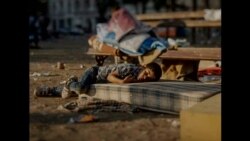The eyes — even when closed — are haunting in these photographs.
Young Syrian refugee children are shown sleeping on top of broken-down cardboard boxes on a city street, or in a field wrapped in dirty blankets on the ground. The lucky ones have a bed and a roof over their heads.
Those who can't sleep look back with vacant stares, with fear or sadness, or with tears streaming down their cheeks — all expressions of the pain of being a Syrian refugee with no home and an uncertain future in the Middle East or Europe.
One two-year-old girl, a refugee in Jordan, pulled a blanket up to her nose but is afraid to close her eyes — perhaps remembering the sound of the bombings back home. More than two million children have been forced from their homes by the brutal five-year-old Syrian war.
WATCH: Haunting images of Syrian children trying to rest
Award-winning Swedish newspaper photographer Magnus Wennman captured the poignant images of sleeping Syrian children, ranging in age from 1 to 17 years old. He said he went to "countless refugee camps" and journeyed with the refugees as they sought safe haven in countries like Jordan, Turkey, Lebanon, Serbia and Greece.
"I believe it can be difficult for outsiders to care about a conflict that has been going on for years," said Wennman, “but there is nothing hard to understand about how children need a safe place to sleep.”
Benefits to nearby camps
Wennman said the children in refugee camps close to the Syrian border are better off than those who have fled to Europe.
"The children and families in refugee camps near Syria's borders have a roof over their head and do not go hungry," he said, but they wonder if they will ever be able to return home again.
Those who go to Europe are probably not planning to return to Syria, he said.
"The journey is often very risky, and people die every day," he said. They are "doing it for the children, so they can have a better life."
The photographer said it was particularly heartbreaking when Hungary closed its border to thousands of Syrian families.
"Families and children were forced to sleep outside a four-meter-high gate," just millimeters from the border, he explained. "Some children had to pick apples from the trees just to get something to eat."
To raise awareness of the Syrian war, the U.N.-refugee agency UNHCR exhibited Wennman's photos in Washington, D.C.
Proceeds from sales of his prints are being donated to the agency, which is holding a conference on March 30 in Geneva to encourage governments to boost their support for the refugees and offer them more places to stay.
Wennman hopes his images of the innocent victims of war will remind the world that millions of Syrian refugees need their help. "Don't turn your back on them," he said.











